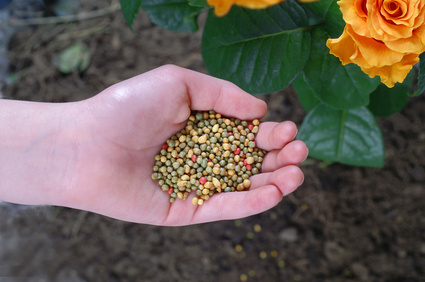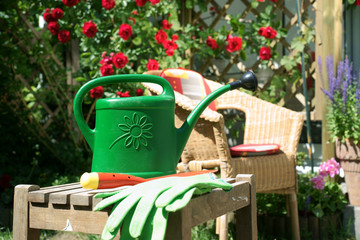September is a quiet time generally in the rose garden with rose pruning completed for another year and it is still a couple of months until the first blooms start appearing. However, September is usually the first-month roses need an application of fertiliser to get them off to a good start for the growing season ahead.

Roses need fertilising in order to replace nutrients that are lost when plant matter is removed through pruning and de-heading. A well-fed plant will also grow much better and be healthier hence it is important to feed you roses with a balanced fertiliser for best results. Like pruning roses, it does need to be done but if you are a week or two late applying, it is not the end of the world.
There are many elements required for good plant growth and these are taken up by the plant through its roots. If lacking in a certain element, growth and performance of the plant will be affected, likewise, you can also have too much of a good thing as well and end up wasting fertiliser for no benefit.
There is a huge array of fertilisers on the market for a wide range of plants including roses. Almost all with have the letters NPK on the bag with numbers beside them. NPK stands for (N) Nitrogen, (P) Phosphorus, and (K) Potassium and is the percentage of the element in the fertiliser. Nitrogen promotes vegetative growth in plants, Phosphorus promotes root and shoot growth and Potassium promotes fruit and flowering in plants.
There are also other elements in fertilisers like sulphur, manganese, calcium, boron and iron. All are required for good growth and flowering even if in very small quantities. Knowing what NPK stands for will help when reading bags of fertiliser as you can decide which is best for your garden. Generally, anything for flowering plants will be suitable to fertilise your roses with – there are even branded rose fertilisers such as Neutrog ‘Sudden Impact for Roses’ which is available exclusively for rose society members to purchase.
In late August and into September, you want to get your first application on as the roses are coming into growth. Read the application rates on whatever you use and always apply fertiliser to damp soils, scattering around the plants and then hoeing in lightly. If applying fertilisers when the soil is dry, you can end up with the fertiliser burning the roots and the plants will sulk.
 You then want to do similar applications in December after the first flush of blooms and again no later than the end of February. After this time, let the roses prepare for winter by allowing the canes to harden up. Sometimes fertiliser is applied with a summer trim when the roses are cut back, fed and watered to get them coming away into flower for a great autumn display in March and April. This often done after the Christmas holiday season when our roses are not always looked after very well and can also be used to get roses in flower for a certain date, although there are no guarantees due to factors like temperature, rainfall/irrigation and nutrition. Experts in your local rose society will be able to give you a better idea of timing for your local conditions.
You then want to do similar applications in December after the first flush of blooms and again no later than the end of February. After this time, let the roses prepare for winter by allowing the canes to harden up. Sometimes fertiliser is applied with a summer trim when the roses are cut back, fed and watered to get them coming away into flower for a great autumn display in March and April. This often done after the Christmas holiday season when our roses are not always looked after very well and can also be used to get roses in flower for a certain date, although there are no guarantees due to factors like temperature, rainfall/irrigation and nutrition. Experts in your local rose society will be able to give you a better idea of timing for your local conditions.
In April, apply lime to your soil, preferably dolomite or prilled lime as this works quicker than agricultural lime to raise the pH of your soil. Roses like a slightly acidic soil between 6 to 6.5 on the pH scale. Remember 1 is acid and 14 is alkaline.
When planting roses, you can use a bit of blood and bone in the hole but nothing else as it may burn the roots of newly planted roses.
Happy fertilising.
In the rose garden for September
- Apply fertiliser at the recommended rates this month. Apply away from the crown of roses and water in well for best results.
- Apply mulch to your roses. There is a vast range of materials around to use. Keep mulch away from the crowns and for the likes of bark, make sure it is well composted before use.
- Keep an eye on new growth coming away and cut back any stems that the buds fail to come away.
By Hayden Foulds
Hayden also serves as Deputy Chairman of the World Federation of Rose Societies Rose Trials Committee amongst other rose endeavours.










Join the Discussion
Type out your comment here:
You must be logged in to post a comment.